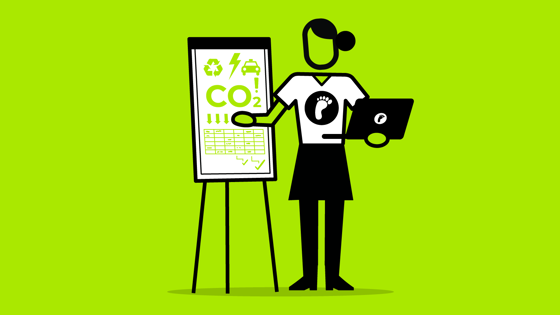Film and TV drama
Sustainability manager

Sustainability is a key part of any film or TV production in the UK. Industry organisations such as the BFI, BAFTA, the BBC, Channel 4 and Netflix all have guidelines for sustainable production. BAFTA albert supports the film and TV industry. You will see the albert footprint logo on screen for programmes which have taken steps to lower their carbon footprint.
All cast and crew on a production have a responsibility for working sustainably. On bigger productions it’s becoming more common to have a dedicated person or team looking after the sustainability plan. On smaller productions it may be part of the production management department.
What does a sustainability manager do?
Sustainability managers will start work at an early stage to create a plan for the whole production or series. They work with the producer and line producer to decide how to make a film or TV programme sustainable.
This will include making sure the production uses local staff and suppliers to avoid unnecessary journeys, and planning travel to locations for the crew. The plan is also likely to cover things like carbon calculation, the disposal of waste after the production, and the use of renewable energy where possible. They will also think about engaging with the local community e.g. donating props and scenery to local groups.
Having worked out a plan, the sustainability manager discusses the details with heads of department and the production accountant and works out how much it will cost. They work out what is essential and what else they can aim for. Once it’s agreed they need to talk to the whole crew about their responsibilities.
They also make sure all the relevant paperwork is filled out and handed in on time. This is often a condition in the contract the production has with the broadcaster or streamer who has asked them to make the drama or programme so it’s really important.
They may hire and lead a team to put the plan into action, and they will supervise the collection of data and conduct an evaluation report when the production is finished.
Watch and read
- Sustainability manager Tilly Ashton
- Sustainability manager Louise Marie Smith
- Mairi Claire Screen Sustainability Manager for Scotland
- https://theflint.media/tilly-ashton-sustainability-manager-i-do-think-it-is-vital-that-we-are-seen-as-central-to-the-prep-planning-and-execution-of-a-production/
- https://www.screenglobalproduction.com/amp/news/2021/10/29/case-study-jurassic-world-dominion#!
- https://www.screen.scot/news/features/mairi-claire-bowser-on-embedding-sustainability-within-scotlands-screen-sector
What’s a sustainability manager good at?
- Organisation and planning: plan and put into action a sustainability strategy, create a schedule, create a budget
- Communication: able to support senior colleagues and educate cast and crew and suppliers to help them make sustainable decisions. Get on well with a wide range of people, be clear about the benefits of sustainability planning, ensure everyone understands what needs to happen when and why
- Patience and resilience: able to listen carefully, to understand issues as they arise and resolve problems quickly
- Innovation: think clearly when the unexpected happens, come up with good ideas even when under pressure
- Knowledge: good knowledge of regional, national and global environmental policy, legislation and the importance of reporting
- Understanding of production: understand how film and TV content is made, and the decisions which need to be made throughout the process
Who does a sustainability manager work with?
The sustainability manager will work closely with the line producer, the production accountant and the production manager. They will also need to liaise with the heads of department on the production and they will also manage the sustainability coordinator and sustainability assistant, and on some productions the production coordinator or production runner.
This job profile was supported by Into Film.
How do I become a sustainability manager?
Sustainability manager is a senior role, and people come into it through a variety of different routes. You’ll be expected to have some knowledge of both film and TV production and the science behind sustainability and climate change. You will also need understand the environmental impact of production. This may mean you’ll have studied film and TV production, or sustainability and environmental science or both. You may already be working in production management or have a senior sustainability role in another industry.
At school or college
If you want to go to university, A levels or Highers in in drama and theatre, English, film studies, media studies, or environmental science are useful. Or you might want to take the following level 3 vocational qualifications:
- OCR Level 3 Certificate in Sustainability
- BTEC Level 3 Certificate in Environmental Sustainability
- WJEC Level 3 qualification Sustainability in Practice
- NCFE Level 3 Certificate in Championing Sustainability in the Workplace
- ProQual Level 3 Award in Environmental Management
- ONC Level 3 Diploma in Environmental Science
- OCR Cambridge Technical Diploma/Extended Diploma in Performing Arts
- BTEC National Diploma/Extended Diploma in Performing Arts
- BTEC National Extended Diploma in Creative Digital Media Production
- Aim Awards Diploma in Creative and Digital Media
- OCR Technical Diploma in Digital Media (Moving Image and Audio Production)
- BTEC National Diploma in Film and Television Production
- BTEC National Diploma in Film and Television Visual Effects
- RSL Diploma/Extended Diploma in Creative and Performing Arts
- UAL Diploma/Extended Diploma in Creative Media Production and Technology
- UAL Diploma/Extended Diploma in Performing and Production Arts
- T level Media, Broadcast and Production
Get an apprenticeship
An apprenticeship is a job with training, so it’s a great opportunity to earn while you learn. However, if you want to get into sustainability via the production route, it can be challenging to find jobs as an apprentice within production companies. It’s worth looking for an apprenticeship in sustainability.
This will help you develop your skills that you can bring into film and TV drama at a later point. Check out what’s an apprenticeship? to learn more about apprenticeships and find an apprenticeship to learn how to find one in your region, or approach companies directly. Go to ScreenSkills information on apprenticeships for the main apprenticeship schemes in film and television.
Get work experience
Work or volunteer in a sustainability role in any industry, volunteer at school, college or university for roles which may include recycling, waste disposal or measuring energy usage.
Get a degree
A degree is not essential but if you want a degree, a course in media studies, media production, film production or film history will equip you with knowledge and experience of cinema or television and production sets. Have a look at ScreenSkills’ list of recommended courses and select one in film and TV. We recognise courses with our ScreenSkills Select award where they offer training in the relevant software, dedicated time to building a portfolio and have strong links with the film and TV industries.
The BAFTA albert education partnership is an initiative created for media courses run by UK Higher Education institutions. Through a comprehensive module, students will gain a fundamental understanding of the climate and nature crises, be introduced to sustainability within the screen industries both on and off screen and have exclusive access to the BAFTA albert student carbon calculator (based on the industry toolkit now mandated by all major UK broadcasters and many film funders).
More scientific courses in sustainability, environmental science and environmental management are also relevant. The IEMA have a list of approved university courses in environmental management and sustainability.
Take a short course
ScreenSkills has an introductory e-learning module about sustainability.
ScreenSkills series of e-learning modules Getting into the screen industries is designed to support people looking to get their first break in the screen industries. (Note this series is available for under 18s. Parents or teachers can e mail info@screenskills.com for the link)
Go to the list of training courses recommended by ScreenSkills and check if there is one about sustainability currently running.
The albert Academy also has a list of workshops https://wearealbert.org/academy/
IEMA (The Institute of Environmental Management and Assessment) run an Environmental Sustainability Skills for the Workforce course and also have other training and e learning.
Work in sustainability
You may be able to get a job locally working in an entry level sustainability role.
Network:
Go to industry events to meet people working in film and TV. Go to how to network well for some tips.
Network online:
Create a LinkedIn profile. See if there are Facebook pages or other social media groups for people making films or TV in your area. There might even be groups for runners and trainees. Join them. Create a ScreenSkills profile. There are a lot of crewing agencies that will charge you to be on their books. Sign up to the free ones initially. Wales Screen, Northern Ireland Screen and other areas offer free crew databases. Find a film office near you and get connected. If you do sign up to paid sites, make sure they specialise in the areas in which you’re interested.
Become a trainee:
Apply for ScreenSkills’ Trainee Finder scheme as a production trainee. If you are successful, you get placements, make contacts and build up the industry knowledge to get work in production management in film or TV drama.







